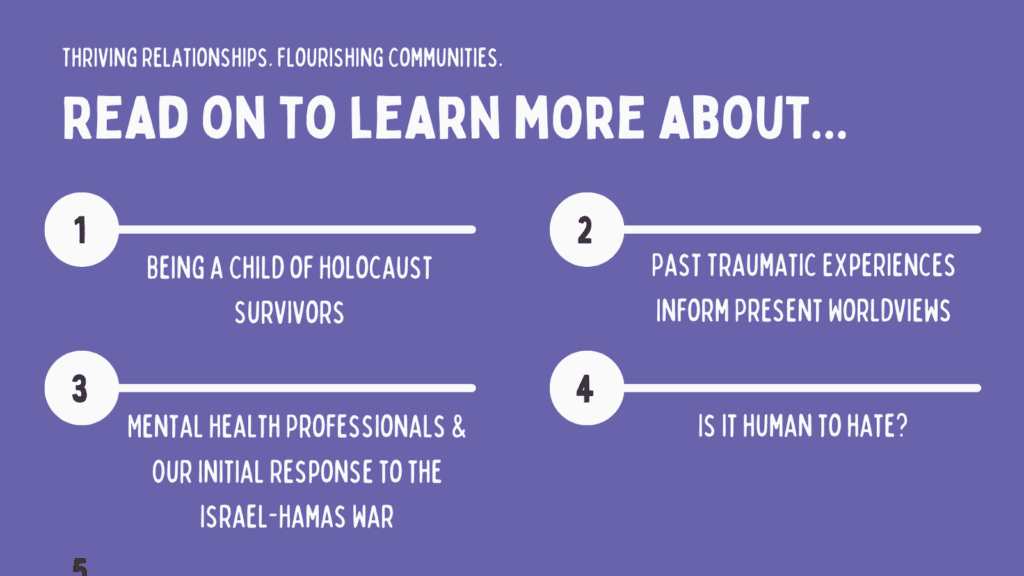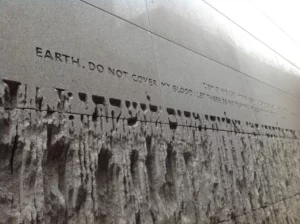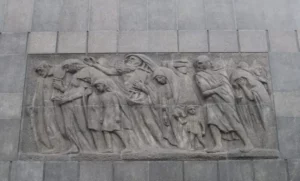Am I a Unicorn? A Therapist & Child of Holocaust Survivors On the Israel-Hamas War
On October 7, 2023, Hamas carried out a coordinated terrorist attack on innocent Israeli citizens and even took hostages. In response, Israel declared war on Hamas, and The Israel Defense Force vowed to “destroy Hamas.” Like everyone else, CFR Clinicians were horrified by Hamas’s brutality and have been processing the recent events like most people. One such CFR Clinician is Dr. Bea Hollander-Goldfein. She is the Co-Director of CFR’s Transcending Trauma Project and a Staff therapist. Not only that, but Dr. Hollander-Goldfein is the child of Holocaust survivors. Here are her thoughts: a therapist and child of Holocaust survivors on the Israel-Hamas War.
Note: Statistics as of October 10, 2023.
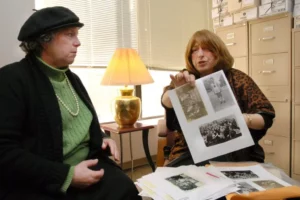
Pictured here are CFR’s Co-Directors of the Transcending Trauma Project, Dr. Nancy Isserman (left) and Dr. Bea Hollander-Goldfein (right), reviewing images of the Holocaust.
Being a Child of Holocaust Survivors
I am a child of Holocaust survivors. I do not know if I want to express pain, fear, or outrage in response to the war between Israel and Hamas.
As a child of Holocaust survivors, I knew about the Holocaust and my parents’ experience since childhood. Luckily, I was raised knowing about the war and what my parents went through. This way, I did not have to imagine their terror; I knew it. And I did not feel gagged about knowing my thoughts and feelings. This contributed to my mental health despite their suffering. I was also lucky that anger did not characterize my parents’ response to their trauma and, therefore, to me. This also enabled me to face their trauma and to know my feelings about what they went through.
But what I did go through was a profound, unrelenting, and painful question about the meaning of life and the role of God. I believe in God because I kept talking to Him and sometimes yelling at Him, but it was on me to figure out the meaning and purpose of my life. I would often sit in my room, sometimes in the dark, often looking out the window and weeping. There were tears for those lost and tears for my parents’ suffering. The remaining tears were driven by not knowing if life had any meaning after the Holocaust. Through my tears and my struggle, I resolved and found peace in the determination that the meaning of life is people – the care, love, and connection to people. Nothing else mattered. And so that is what has guided my life.
This belief sustained me, and I believe that the Holocaust taught me about the importance of humanity after such inhumanity and that this lesson was learned. It had to have been learned. The Holocaust was the ultimate evil against humankind. How could people not have learned the lesson about the price of inhumanity – and the senseless suffering caused by hatred?
So, the lesson for me was that the evil of causing human suffering and the importance of caring for others as we care for ourselves are of prime importance.
Simple – right?
The religious faiths agree. Right?
Past Traumatic Experiences Inform Present Worldviews
I had a guiding light, and my life never contradicted this belief. I remember my mother crying when watching the news showing documentaries of Black people being sent to the back of the bus and the battle for integration. From her victimhood, she learned the importance of the right for everyone to be treated equally and humanely. And I grew up with society moving towards equality. I was part of the college protests that prepared the way for open admissions and affirmative action. The world was learning.
Or so I believed.
So, one day, I was reading a featured story in a newspaper. It presented excerpts from a research project that had gathered diaries from English citizens 20 years after WWII. These diaries represented a cross-section of British society. The excerpts had many statements about antagonism towards Jews, casually stated as a normal part of life. I am embarrassed to admit that I was “shocked.” I was so shocked that I discussed the diary excerpts with my grown children when we gathered for the weekend Sabbath meal.
They were silent after I spoke. Moments later, my daughter-in-law said, somewhat cautiously, that my children see me as a “unicorn.” I was silent and incredulous. I demanded that they explain what they mean. It felt like an insult. Gradually, they explained that they were not surprised by these expressions of anti-Semitism and that my surprise reflects my lack of recognition that hatred in various forms towards others is not uncommon in society.
My young adult children already knew this. Sadness overwhelmed me. Maybe I am a unicorn.
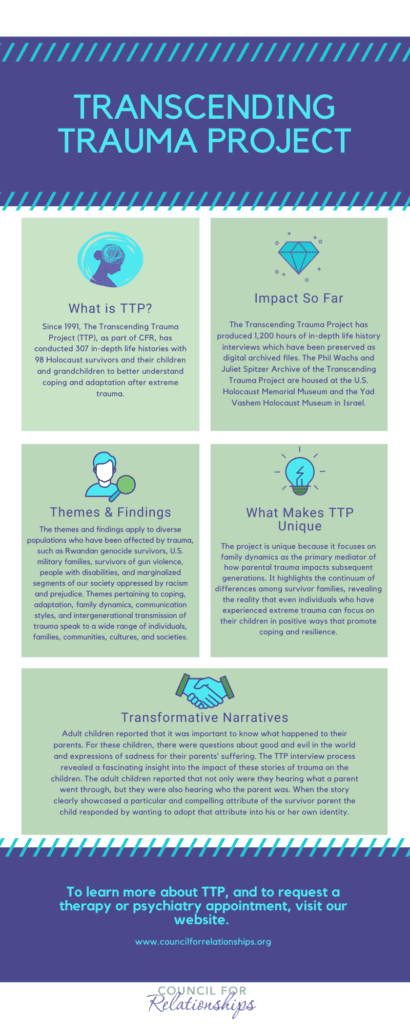 Mental Health Professionals & Our Initial Response to the Israel-Hamas War
Mental Health Professionals & Our Initial Response to the Israel-Hamas War
On October 7, 2023, Israel was invaded by Hamas terrorists from Gaza. We know from news reports at the time that over 1,300 Israeli civilians were murdered in savage ways. Women were raped, beaten and murdered. Children were killed in front of their parents, and parents were killed in front of children. Over 150 people were taken as hostages to Gaza.
The news reports were heartbreaking and overwhelming. It is impossible to comprehend this kind of savagery. This is terrorism, and this is evil. These are war crimes. How do we hold this reality?
Soon, Israel declared war against Hamas and began to bomb sites that are Hamas strongholds for weaponry and bombs. These sites were located in neighborhoods where Gazans live and mosques where Gazans pray. It is unbearable to witness the suffering of Gazan civilians holding their wounded and wailing for their dead, including their children.
Yes, all of this was and is on the news. What should we feel?
What emerges along with the documentation of suffering, which is unbearable to watch? Hatred!
My colleague posted on a list of mental health practitioners that she wanted to acknowledge the suffering experienced by Israelis due to the terrorist attack. Her post was met with support, along with posts that condemned her and Israel and advocated, with anger, justification for the atrocities.
The journalist Joshua Leifer posted on X. “Self-professed human rights defenders are celebrating and glorifying unspeakable acts that violate the most basic elements of human life. I feel sick.”
This should go against every sense of humanity, especially for mental health professionals. Right? Am I crazy? Or am I just a unicorn?
Where is the humanity in those espousing politics over people? Where is the sensitivity, pain, and support for all those who suffer, not just those considered on the right side of political positions? How do humans lose touch with their humanity, compassion, and pain for others?
This is not new, but I cannot comprehend this emotional blindness, this emotional deadness, this cognitive delusion, this absolute expression of self-centeredness.
Is it human to hate?
I do not understand anti-Semitism. I do not understand racism. I do not understand how Hitler turned Europe into a killing machine. I do not understand murders, tortures, rapes, or beheadings where ever it happens. I do not understand when a mental health professional gets angry at the expression of sympathy for those in Israel who were massacred on October 7 – the worst attack on Jews since the Holocaust.
You can have your opinion about political realities and political solutions, but how can you not feel for those who suffered and those who lost their loved ones and the normalcy of their lives? How can the child, who beseeched God be asked to help her find the meaning of life, cope with finding the answer and then having it ripped away? What is the fundamental nature of our humanity? Can you explain it to me?
Are we condemned to not learn from history? Are we doomed to repeat history? Is it just human to hate? Or can we change the tide by simply loving others as we love ourselves and holding this belief against all rationales for hatred? Does this belief make me a unicorn or just a human being?

Dr. Bea Hollander-Goldfein, LMFT (pictured here), is the Co-Director of The Transcending Trauma Project.
About the Author
Bea Hollander-Goldfein, PhD, LMFT, is the Director of CFR’s Transcending Trauma Project and a Staff Therapist. Dr. Hollander-Goldfein has authored numerous books, including Transcending Trauma: Survival, Resilience, and Clinical Implications in Survivor Families. Click here to learn more about Dr. Hollander-Goldfein and to request an appointment with her.
If you are looking for individual, couple, or family therapy or psychiatry, click here to request an appointment. See our Therapist & Psychiatrist Directory for additional CFR therapists or psychiatrists near you.

